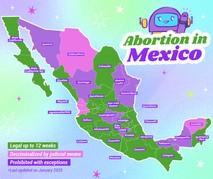Currently, in Mexico, it is possible to access safe abortion services. Although criminal legislation varies by state, throughout the country, it is possible to request a legal termination of pregnancy if you were a victim of rape. Also, in Baja California, Baja California Sur, Chiapas, México City, Coahuila, Colima, Estado de México, Guerrero, Hidalgo, Jalisco, Michoacán, Oaxaca, Puebla, Quintana Roo, Veracruz, San Luis Potosí and Zacatecas, voluntary abortion is accessible during the first 12 weeks of gestation freely, safely, and free of charge. In the case of Aguascalientes, abortion is legal up to week 6 and Sinaloa up to week 13.
Additionally, it is important to highlight that in September 2021, the Supreme Court of Justice of the Nation established, in the case of Coahuila, that criminalizing abortion without leaving any margin for women and people with the capacity to gestate to be able to have an abortion is unconstitutional and violates rights such as the free development of personality, equality and non-discrimination, health, and sexual and reproductive rights.This decision set a precedent regarding the decriminalization of abortion and in September 2023 abortion was decriminalized throughout the country, eliminating the crime of voluntary abortion from the Federal Penal Code, which means that no woman or pregnant person can be punished for aborting. or for performing an abortion, in the case of health personnel.
It is necessary to mention that, in all states of the Mexican Republic, there is the presence of at least one group, network, organization, or feminist collective of safe abortion companions willing to provide information on access to safe abortion services.








